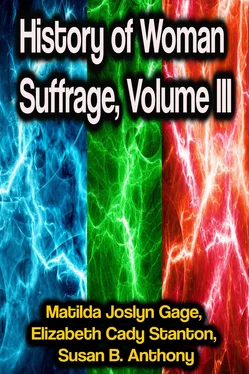Advisory Committee —Sarah Pugh, Pa.; Isabella Beecher Hooker, Conn.; Charlotte B. Wilbour, N. Y.; Mary J. Channing, R. I.; Elizabeth B. Schenck, Cal.; Judith Ellen Foster, Iowa; Lavinia Goodell, Wis.; Annie R. Irvine, Mo.; Marian Bliss, Mich.; Mary B. Moses, N. H.; Sarah A. Vibbart, Mass.; Lucy A. Snowe, Me.; Marilla M. Ricker, N. H.; Mary Madden, Ohio; Emma Molloy, Ind.; Cynthia A. Leonard, Ill.; Mrs. Dr. Stewart, Minn.; Julia Brown Bemis, Neb.; Mrs. N. H. Cramer, Tenn.; Mrs. W. V. Tunstall, Tex.; Mrs. A. Millspaugh, La.; Hannah M. Rogers, Fla.; Sally Holly, Va.; Sallie W. Hardcastle, Md.; Mary P. Sautelle, Oregon; Mary F. Shields, Col.; Amelia Giddings, Wash. Ter.; Amalia B. Post, Wyoming Ter.
Corresponding Secretaries —Susan B. Anthony, Rochester, N. Y.; Laura Curtis Bullard, New York; Jane Graham Jones, Chicago, Ill.
Recording Secretary —Lillie Devereux Blake, New York.
Treasurer —Ellen Clark Sargent, Washington, D. C.
Executive Committee —Matilda Joslyn Gage, Fayetteville, N. Y.; Clemence S. Lozier, M. D., Elizabeth B. Phelps, Mathilde F. Wendt, Phebe H. Jones, New York; Rev. Olympia Brown, Connecticut; Sarah R. L. Williams, Ohio; M. Adeline Thomson, Pennsylvania; Henrietta Payne Westbrook, Pennsylvania; Nancy R. Allen, Iowa.
[6] 1876 Campaign Committee—Susan B. Anthony, N. Y.; Matilda Joslyn Gage, N. Y.; Phoebe W. Couzins, Mo.; Rev. Olympia Brown, Conn.; Jane Graham Jones, Ill.; Abigail Scott Duniway, Oregon; Laura De Force Gordon, Cal.; Annie C. Savery, Iowa.
[7] Resident Congressional Committee—Sara Andrews Spencer, Ellen Clark Sargent, Ruth Carr Denison, Belva A. Lockwood, Mrs. E. D. E. N. Southworth.
[8] Among those who took part in the discussions were Dr. Clemence Lozier, Susan B. Anthony, Helen M. Slocum, Sarah Goodyear, Helen M. Cook, Abby and Julia Smith, Sara Andrews Spencer, Miss Charlotte Ray, Lillie Devereux Blake and Matilda Joslyn Gage.
[9] Letters were written to these conventions from different States. Mrs. Elizabeth L. Saxon, New Orleans, La.; Elizabeth A. Meriwether, Memphis, Tenn.; Mrs. Margaret V. Longley, Cincinnati, O., all making eloquent appeals for some consideration of the political rights of women.
[10] Mrs. Mott, Mrs. Stanton, Mrs. Gage, and Mrs. Spencer.
[11] On the receipt of these letters a prolonged council was held by the officers of the association at their headquarters, as to what action they should take on the Fourth of July. Mrs. Mott and Mrs. Stanton decided for themselves that after these rebuffs they would not even sit on the platform, but at the appointed time go to the church they had engaged for a meeting, and open their convention. Others more brave and determined insisted that women had an equal right to the glory of the day and the freedom of the platform, and decided to take the risk of a public insult in order to present the woman's declaration and thus make it an historic document.—[E.C.S.
[12] During the reading of the declaration to an immense concourse of people, Mrs. Gage stood beside Miss Anthony, and held an umbrella over her head, to shelter her friend from the intense heat of the noonday sun; and thus in the same hour, on opposite sides of old Independence Hall, did the men and women express their opinions on the great principles proclaimed on the natal day of the republic. The declaration was handsomely framed and now hangs in the vice-president's room in the capitol at Washington.
[13] This document was signed by Lucretia Mott, Elizabeth Cady Stanton, Paulina Wright Davis, Ernestine L. Rose, Clarina I. H. Nichols, Mary Ann McClintock, Mathilde Franceska Anneke, Sarah Pugh, Amy Post, Catharine A. F. Stebbins, Susan B. Anthony, Matilda Joslyn Gage, Clemence S. Lozier, Olympia Brown, Mathilde F. Wendt, Adleline Thomson, Ellen Clark Sargent, Virginia L. Minor, Catherine V. Waite, Elizabeth B. Schenck, Phoebe W. Couzins, Elizabeth Boynton Harbert, Laura De Force Gordon, Sara Andrews Spencer, Lillie Devereux Blake, Jane Graham Jones, Abigail Scott Duniway, Belva A. Lockwood, Isabella Beecher Hooker, Sarah L. Williams, Abby P. Ela.
[14]
One hundred years hence, what a change will be made,
In politics, morals, religion and trade,
In statesmen who wrangle or ride on the fence,
These things will be altered a hundred years hence .
Our laws then will be uncompulsory rules,
Our prisons converted to national schools.
The pleasure of sinning 'tis all a pretense,
And the people will find it so, a hundred years hence .
Lying, cheating and fraud will be laid on the shelf,
Men will neither get drunk, nor be bound up in self,
But all live together, good neighbors and friends,
Just as Christian folks ought to, a hundred years hence .
Then woman, man's partner, man's equal shall stand,
While beauty and harmony govern the land,
To think for oneself will be no offense,
The world will be thinking a hundred years hence .
Oppression and war will be heard of no more,
Nor the blood of a slave leave his print on our shore,
Conventions will then be a useless expense,
For we'll all go free-suffrage a hundred years hence .
Instead of speech-making to satisfy wrong,
All will join the glad chorus to sing Freedom's song;
And if the Millenium is not a pretense,
We'll all be good brothers a hundred years hence .
This song was written in 1852, at Cleveland, Ohio, by Frances Dana Gage, expressly for John W. Hutchinson. Several of the friends were staying with Mrs. Caroline M. Severance, on their way to the Akron convention, where it was first sung.
[15] Protests and declarations were read by Mrs. Elizabeth Boynton Harbert, in Evanston, Ill.; Sarah L. Knox, California; Mrs. Rosa L. Segur, Toledo, Ohio; Mrs. Mary Olney Brown, Olympia, Washington territory; Mrs. Henrietta Paine Westbrook, New York city. In Maquoketa, Iowa; Mrs. Nancy R. Allen read the declaration at the regular county celebration. Madam Anneke, Wis.; Elizabeth Avery Meriwether, Tenn.; Lucinda B. Chandler, N. J.; Jane E. Telker, Iowa; S. P. Abeel, D. C.; Mrs. J. A. Johns, Oregon; Elizabeth Lisle Saxon, La.; Mrs. Elsie Stewart, Kan.; and many others impossible to name, sent in protests and declarations.
[16] See Appendix.
[17] Henry Hutchinson, the son of John.
[18] A German legend says, God first made a mouse, but seeing he had made a mistake he made the cat as an afterthought, therefore if woman is God's afterthought, man must be a mistake.
[19] Afterwards killed by the Indians in Colorado.
CHAPTER XXVIII.
NATIONAL CONVENTIONS, HEARINGS AND REPORTS.
1877-1878-1879.
Renewed Appeal for a Sixteenth Amendment—Mrs. Gage Petitions for Removal of Political Disabilities—Ninth Washington Convention, 1877—Jane Grey Swisshelm—Letters, Robert Purvis, Wendell Phillips, Francis E. Abbott—10,000 Petitions Referred to the Committee on Privileges and Elections by Special Request of the Chairman, Hon. O. P. Morton, of Indiana—May Anniversary in New York—Tenth Washington Convention, 1878—Frances E. Willard and 30,000 Temperance Women Petition Congress—40,000 Petition for a Sixteenth Amendment—Hearing before the Committee on Privileges and Elections—Madam Dahlgren's Protest—Mrs. Hooker's Hearing on Washington's Birthday—Mary Clemmer's Letter to Senator Wadleigh—His Adverse Report—Favorable Minority Report by Senator Hoar—Thirtieth Anniversary, Unitarian Church, Rochester, N. Y., July 19, 1878—The Last Convention Attended by Lucretia Mott—Letters, William Lloyd Garrison, Wendell Phillips—Church Resolution Criticised by Rev. Dr. Strong—International Women's Congress in Paris—Washington Convention, 1879—U.S. Supreme Court Opened to Women—May Anniversary at St. Louis—Address of Welcome by Phoebe Couzins—Women in Council Alone—Letter from Josephine Butler, of England—Mrs. Stanton's Letter to The National Citizen and Ballot-Box .
Читать дальше












